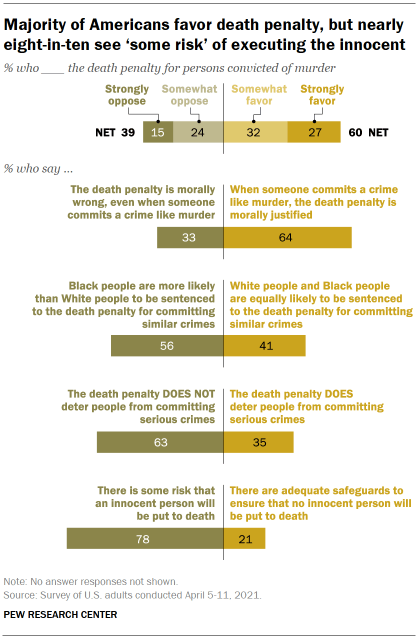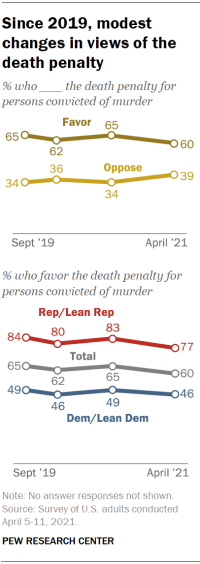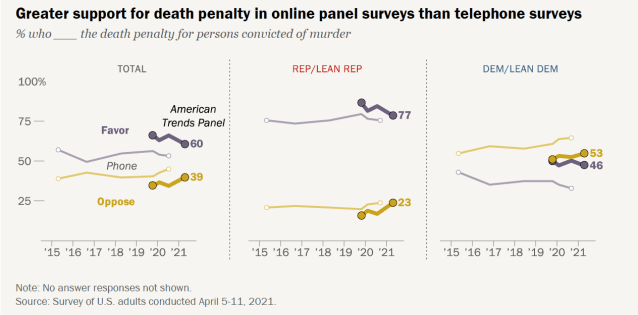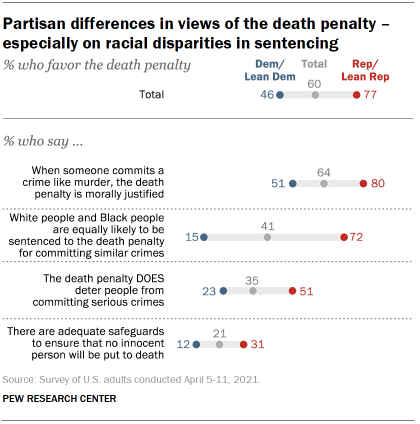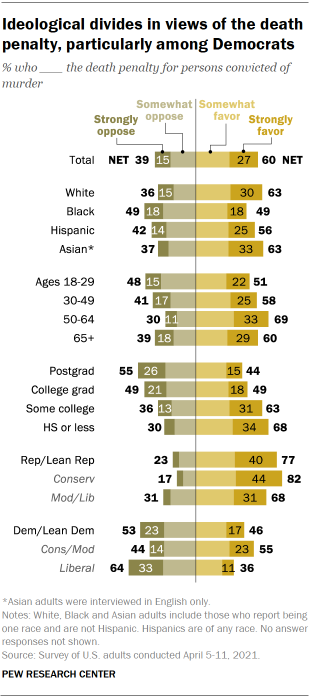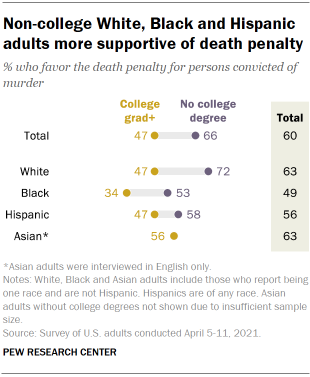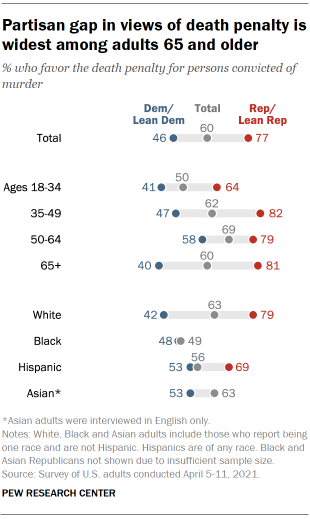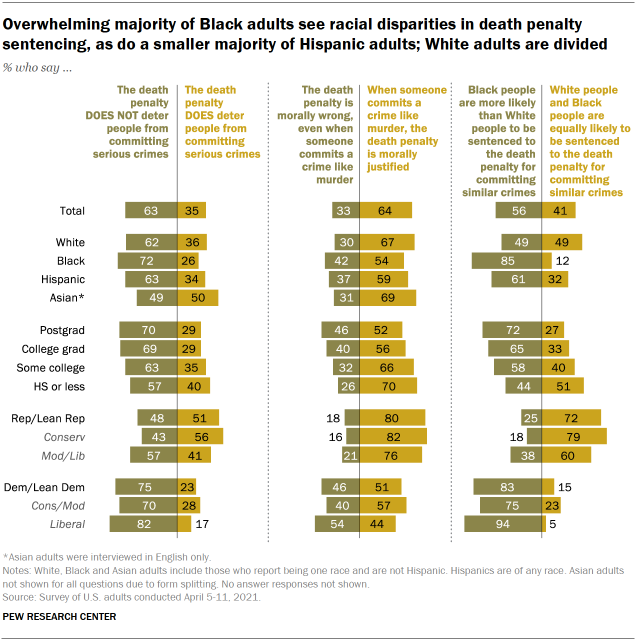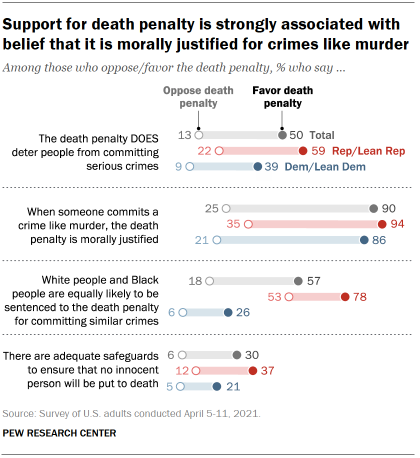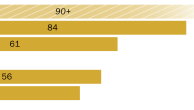78% say there is some risk of innocent people being put to death
Pew Research Center conducted this study to better understand Americans’ views about the death penalty. For this analysis, we surveyed 5,109 U.S. adults from April 5 to 11, 2021. Everyone who took part in this survey is a member of the Center’s American Trends Panel (ATP), an online survey panel that is recruited through national, random sampling of residential addresses. This way nearly all U.S. adults have a chance of selection. The survey is weighted to be representative of the U.S. adult population by gender, race, ethnicity, partisan affiliation, education and other categories. Read more about the ATP’s methodology.
Here are the questions used for the report, along with responses, and its methodology.
The use of the death penalty is gradually disappearing in the United States. Last year, in part because of the coronavirus outbreak, fewer people were executed than in any year in nearly three decades.
Yet the death penalty for people convicted of murder continues to draw support from a majority of Americans despite widespread doubts about its administration, fairness and whether it deters serious crimes.
More Americans favor than oppose the death penalty: 60% of U.S. adults favor the death penalty for people convicted of murder, including 27% who strongly favor it. About four-in-ten (39%) oppose the death penalty, with 15% strongly opposed, according to a new Pew Research Center survey.
The survey, conducted April 5-11 among 5,109 U.S. adults on the Center’s American Trends Panel, finds that support for the death penalty is 5 percentage points lower than it was in August 2020, when 65% said they favored the death penalty for people convicted of murder.
While public support for the death penalty has changed only modestly in recent years, support for the death penalty declined substantially between the late 1990s and the 2010s. (See “Death penalty draws more Americans’ support online than in telephone surveys” for more on long-term measures and the challenge of comparing views across different survey modes.)
Large shares of Americans express concerns over how the death penalty is administered and are skeptical about whether it deters people from committing serious crimes.
Nearly eight-in-ten (78%) say there is some risk that an innocent person will be put to death, while only 21% think there are adequate safeguards in place to prevent that from happening. Only 30% of death penalty supporters – and just 6% of opponents – say adequate safeguards exist to prevent innocent people from being executed.
A majority of Americans (56%) say Black people are more likely than White people to be sentenced to the death penalty for being convicted of serious crimes. This view is particularly widespread among Black adults: 85% of Black adults say Black people are more likely than Whites to receive the death penalty for being convicted of similar crimes (61% of Hispanic adults and 49% of White adults say this).
Moreover, more than six-in-ten Americans (63%), including about half of death penalty supporters (48%), say the death penalty does not deter people from committing serious crimes.
Yet support for the death penalty is strongly associated with a belief that when someone commits murder, the death penalty is morally justified. Among the public overall, 64% say the death penalty is morally justified in cases of murder, while 33% say it is not justified. An overwhelming share of death penalty supporters (90%) say it is morally justified under such circumstances, compared with 25% of death penalty opponents.
The data in the most recent survey, collected from Pew Research Center’s online American Trends Panel (ATP), finds that 60% of Americans favor the death penalty for persons convicted of murder. Over four ATP surveys conducted since September 2019, there have been relatively modest shifts in these views – from a low of 60% seen in the most recent survey to a high of 65% seen in September 2019 and August 2020.
In Pew Research Center phone surveys conducted between September 2019 and August 2020 (with field periods nearly identical to the online surveys), support for the death penalty was significantly lower: 55% favored the death penalty in September 2019, 53% in January 2020 and 52% in August 2020. The consistency of this difference points to substantial mode effects on this question. As a result, survey results from recent online surveys are not directly comparable with past years’ telephone survey trends. A post accompanying this report provides further detail and analysis of the mode differences seen on this question. And for more on mode effects and the transition from telephone surveys to online panel surveys, see “What our transition to online polling means for decades of phone survey trends” and “Trends are a cornerstone of public opinion research. How do we continue to track changes in public opinion when there’s a shift in survey mode?”
Partisanship continues to be a major factor in support for the death penalty and opinions about its administration. Just over three-quarters of Republicans and independents who lean toward the Republican Party (77%) say they favor the death penalty for persons convicted of murder, including 40% who strongly favor it.
Democrats and Democratic leaners are more divided on this issue: 46% favor the death penalty, while 53% are opposed. About a quarter of Democrats (23%) strongly oppose the death penalty, compared with 17% who strongly favor it.
Over the past two years, the share of Republicans who say they favor the death penalty for persons convicted of murder has decreased slightly – by 7 percentage points – while the share of Democrats who say this is essentially unchanged (46% today vs. 49% in 2019).
Republicans and Democrats also differ over whether the death penalty is morally justified, whether it acts as a deterrent to serious crime and whether adequate safeguards exist to ensure that no innocent person is put to death. Republicans are 29 percentage points more likely than Democrats to say the death penalty is morally justified, 28 points more likely to say it deters serious crimes, and 19 points more likely to say that adequate safeguards exist.
But the widest partisan divide – wider than differences in opinions about the death penalty itself – is over whether White people and Black people are equally likely to be sentenced to the death penalty for committing similar crimes.
About seven-in-ten Republicans (72%) say that White people and Black people are equally likely to be sentenced to death for the same types of crimes. Only 15% of Democrats say this. More than eight-in-ten Democrats (83%) instead say that Black people are more likely than White people to be sentenced to the death penalty for committing similar crimes.
Differing views of death penalty by race and ethnicity, education, ideology
There are wide ideological differences within both parties on this issue. Among Democrats, a 55% majority of conservatives and moderates favor the death penalty, a position held by just 36% of liberal Democrats (64% of liberal Democrats oppose the death penalty). A third of liberal Democrats strongly oppose the death penalty, compared with just 14% of conservatives and moderates.
While conservative Republicans are more likely to express support for the death penalty than moderate and liberal Republicans, clear majorities of both groups favor the death penalty (82% of conservative Republicans and 68% of moderate and liberal Republicans).
As in the past, support for the death penalty differs across racial and ethnic groups. Majorities of White (63%), Asian (63%) and Hispanic adults (56%) favor the death penalty for persons convicted of murder. Black adults are evenly divided: 49% favor the death penalty, while an identical share oppose it.
Support for the death penalty also varies across age groups. About half of those ages 18 to 29 (51%) favor the death penalty, compared with about six-in-ten adults ages 30 to 49 (58%) and those 65 and older (60%). Adults ages 50 to 64 are most supportive of the death penalty, with 69% in favor.
There are differences in attitudes by education, as well. Nearly seven-in-ten adults (68%) who have not attended college favor the death penalty, as do 63% of those who have some college experience but no degree.
About half of those with four-year undergraduate degrees but no postgraduate experience (49%) support the death penalty. Among those with postgraduate degrees, a larger share say they oppose (55%) than favor (44%) the death penalty.
The divide in support for the death penalty between those with and without college degrees is seen across racial and ethnic groups, though the size of this gap varies. A large majority of White adults without college degrees (72%) favor the death penalty, compared with about half (47%) of White adults who have degrees. Among Black adults, 53% of those without college degrees favor the death penalty, compared with 34% of those with college degrees. And while a majority of Hispanic adults without college degrees (58%) say they favor the death penalty, a smaller share (47%) of those with college degrees say this.
Intraparty differences in support for the death penalty
Republicans are consistently more likely than Democrats to favor the death penalty, though there are divisions within each party by age as well as by race and ethnicity.
Republicans ages 18 to 34 are less likely than other Republicans to say they favor the death penalty. Just over six-in-ten Republicans in this age group (64%) say this, compared with about eight-in-ten Republicans ages 35 and older.
Among Democrats, adults ages 50 to 64 are much more likely than adults in other age groups to favor the death penalty. A 58% majority of 50- to 64-year-old Democrats favor the death penalty, compared with 47% of those ages 35 to 49 and about four-in-ten Democrats who are 18 to 34 or 65 and older.
Overall, White adults are more likely to favor the death penalty than Black or Hispanic adults, while White and Asian American adults are equally likely to favor the death penalty. However, White Democrats are less likely to favor the death penalty than Black, Hispanic or Asian Democrats. About half of Hispanic (53%), Asian (53%) and Black (48%) Democrats favor the death penalty, compared with 42% of White Democrats.
About eight-in-ten White Republicans favor the death penalty, as do about seven-in-ten Hispanic Republicans (69%).
Differences by race and ethnicity, education over whether there are racial disparities in death penalty sentencing
There are substantial demographic differences in views of whether death sentencing is applied fairly across racial groups. While 85% of Black adults say Black people are more likely than White people to be sentenced to death for committing similar crimes, a narrower majority of Hispanic adults (61%) and about half of White adults (49%) say the same. People with four-year college degrees (68%) also are more likely than those who have not completed college (50%) to say that Black people and White people are treated differently when it comes to the death penalty.
About eight-in-ten Democrats (83%), including fully 94% of liberal Democrats and three-quarters of conservative and moderate Democrats, say Black people are more likely than White people to be sentenced to death for committing the same type of crime – a view shared by just 25% of Republicans (18% of conservative Republicans and 38% of moderate and liberal Republicans).
Across educational and racial or ethnic groups, majorities say that the death penalty does not deter serious crimes, although there are differences in how widely this view is held. About seven-in-ten (69%) of those with college degrees say this, as do about six-in-ten (59%) of those without college degrees. About seven-in-ten Black adults (72%) and narrower majorities of White (62%) and Hispanic (63%) adults say the same. Asian American adults are more divided, with half saying the death penalty deters serious crimes and a similar share (49%) saying it does not.
Among Republicans, a narrow majority of conservative Republicans (56%) say the death penalty does deter serious crimes, while a similar share of moderate and liberal Republicans (57%) say it does not.
A large majority of liberal Democrats (82%) and a smaller, though still substantial, majority of conservative and moderate Democrats (70%) say the death penalty does not deter serious crimes. But Democrats are divided over whether the death penalty is morally justified. A majority of conservative and moderate Democrats (57%) say that a death sentence is morally justified when someone commits a crime like murder, compared with fewer than half of liberal Democrats (44%).
There is widespread agreement on one topic related to the death penalty: Nearly eight-in-ten (78%) say that there is some risk an innocent person will be put to death, including large majorities among various racial or ethnic, educational, and even ideological groups. For example, about two-thirds of conservative Republicans (65%) say this – compared with 34% who say there are adequate safeguards to ensure that no innocent person will be executed – despite conservative Republicans expressing quite favorable attitudes toward the death penalty on other questions.
Overwhelming share of death penalty supporters say it is morally justified
Those who favor the death penalty consistently express more favorable attitudes regarding specific aspects of the death penalty than those who oppose it.
For instance, nine-in-ten of those who favor the death penalty also say that the death penalty is morally justified when someone commits a crime like murder. Just 25% of those who oppose the death penalty say it is morally justified.
This relationship holds among members of each party. Among Republicans and Republican leaners who favor the death penalty, 94% say it is morally justified; 86% of Democrats and Democratic leaners who favor the death penalty also say this.
By comparison, just 35% of Republicans and 21% of Democrats who oppose the death penalty say it is morally justified.
Similarly, those who favor the death penalty are more likely to say it deters people from committing serious crimes. Half of those who favor the death penalty say this, compared with 13% of those who oppose it. And even though large majorities of both groups say there is some risk an innocent person will be put to death, members of the public who favor the death penalty are 24 percentage points more likely to say that there are adequate safeguards to prevent this than Americans who oppose the death penalty.
On the question of whether Black people and White people are equally likely to be sentenced to death for committing similar crimes, partisanship is more strongly associated with these views than one’s overall support for the death penalty: Republicans who oppose the death penalty are more likely than Democrats who favor it to say White people and Black people are equally likely to be sentenced to death.
Among Republicans who favor the death penalty, 78% say that Black and White people are equally likely to receive this sentence. Among Republicans who oppose the death penalty, about half (53%) say this. However, just 26% of Democrats who favor the death penalty say that Black and White people are equally likely to receive this sentence, and only 6% of Democrats who oppose the death penalty say this.
CORRECTION (July 13, 2021): The following sentence was updated to reflect the correct timespan: “Last year, in part because of the coronavirus outbreak, fewer people were executed than in any year in nearly three decades.” The changes did not affect the report’s substantive findings.
